中考英语单项选择汇编
图片预览
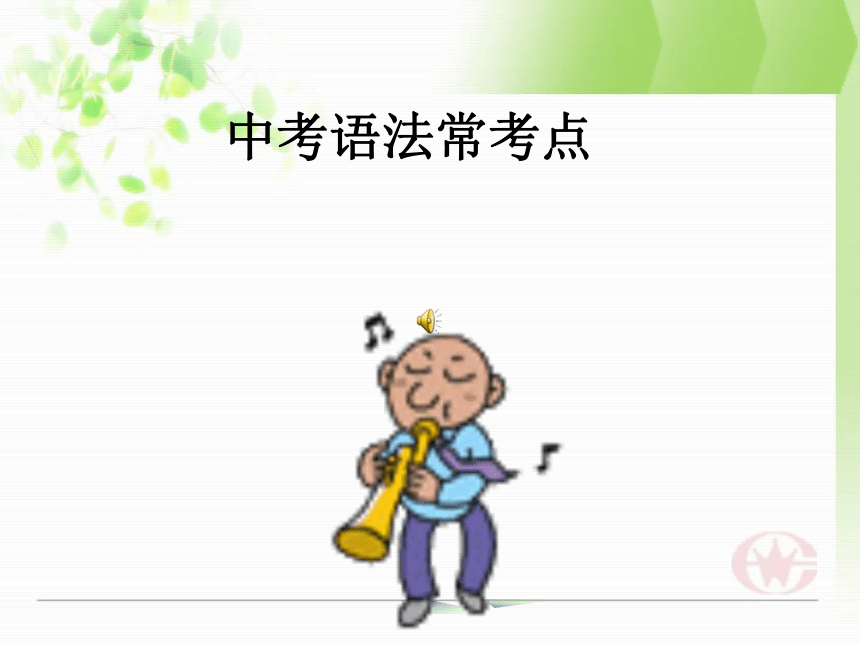

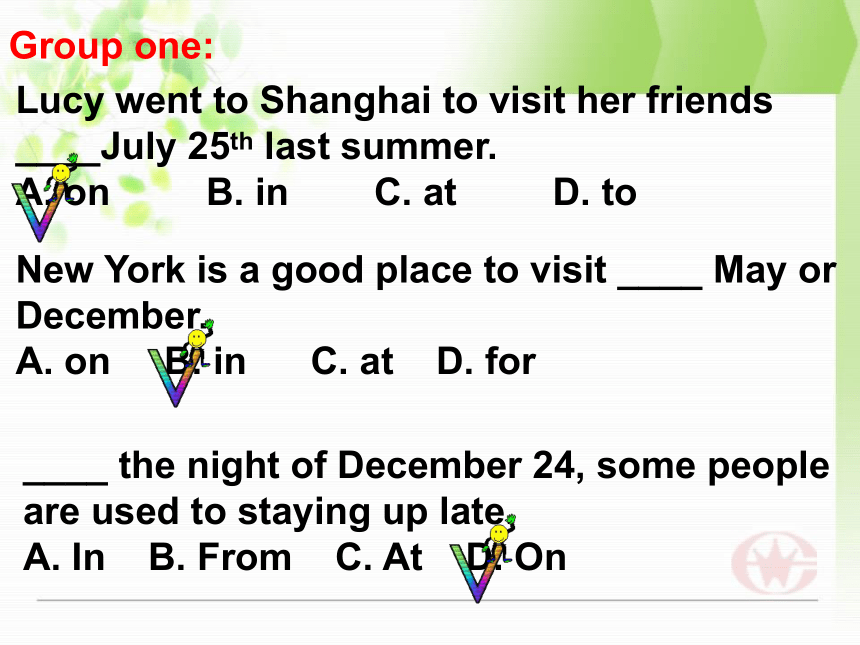
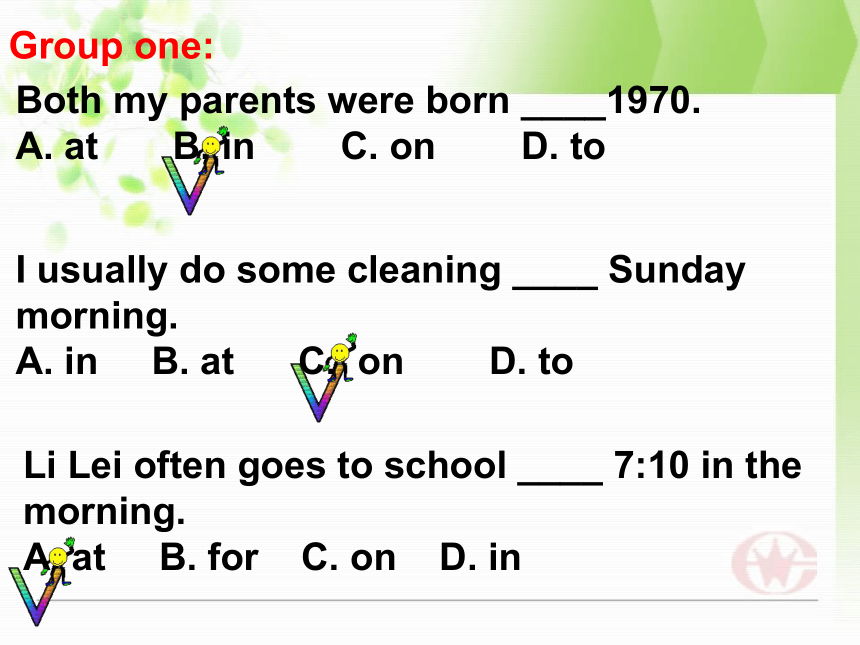
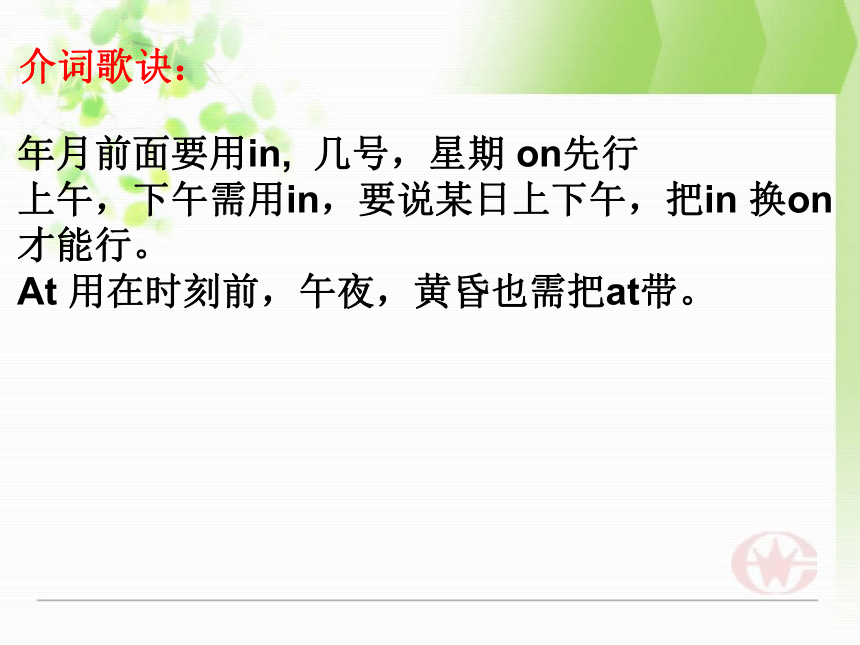
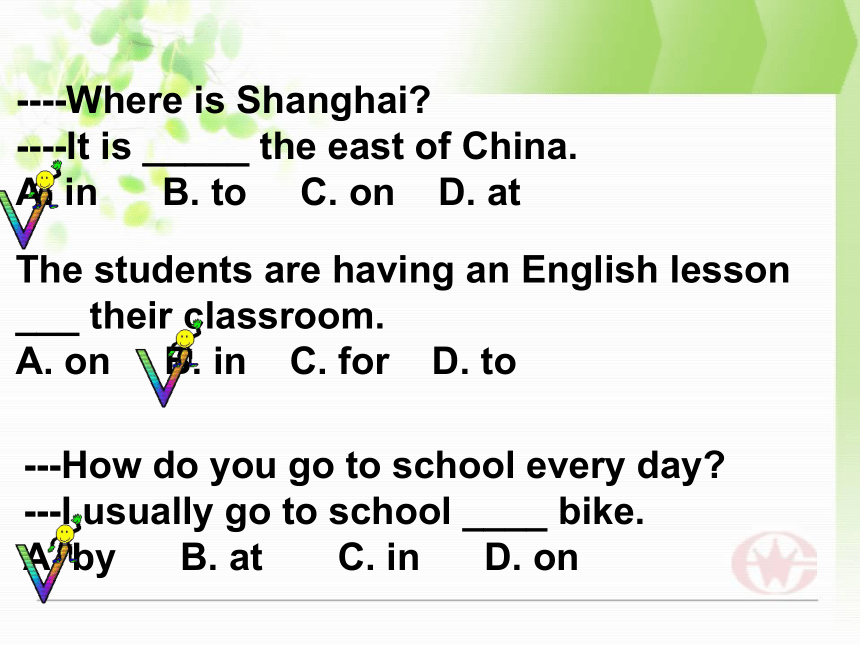
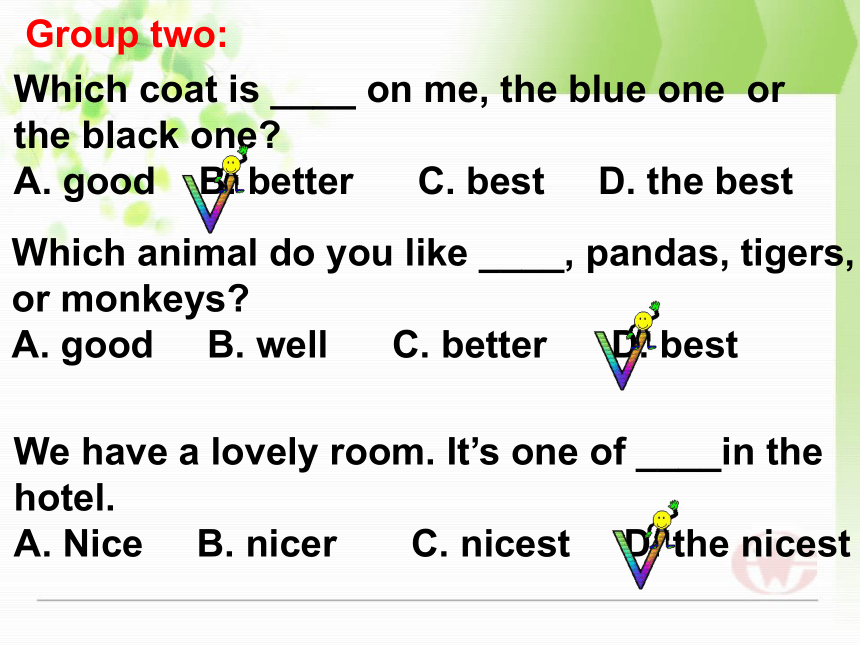
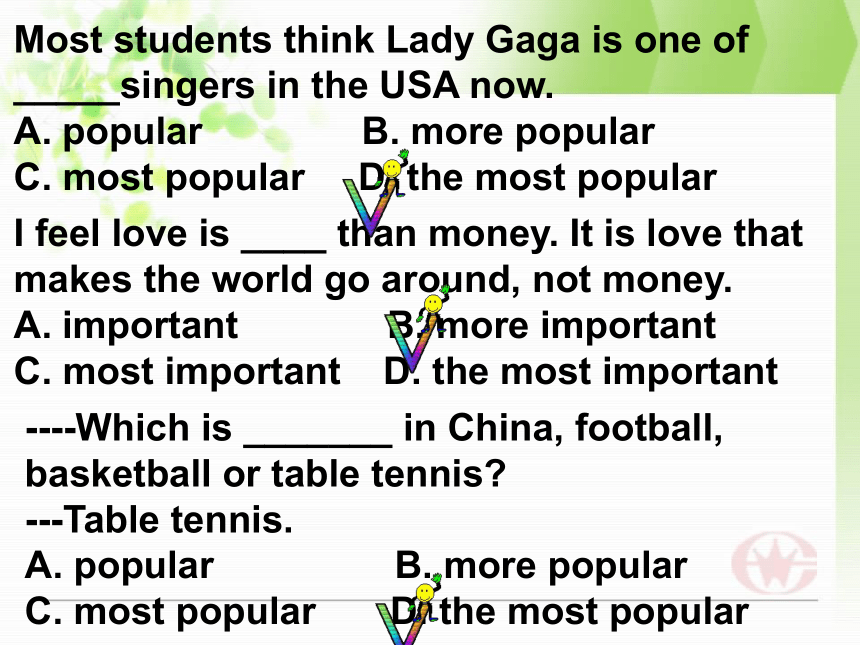
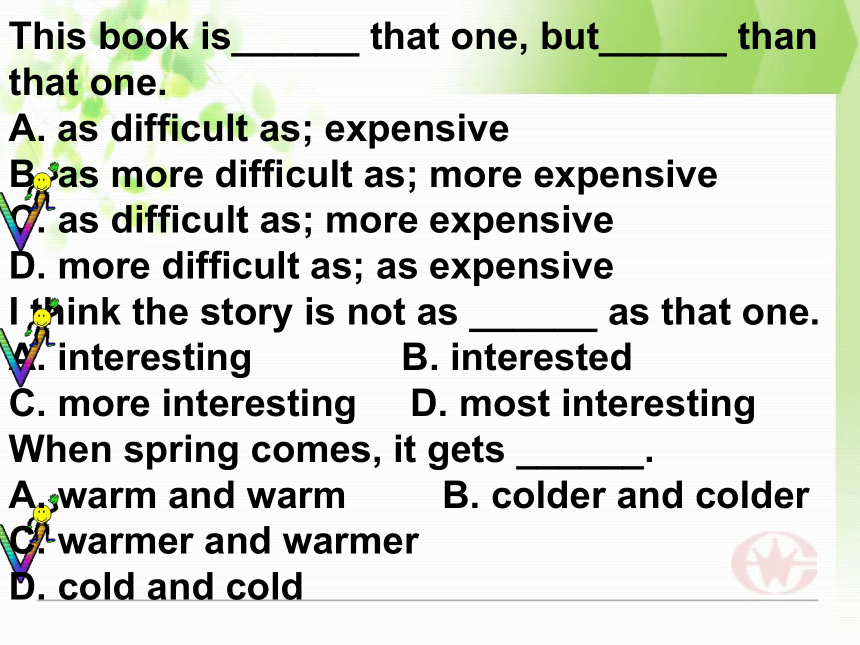
文档简介
(共26张PPT)
中考语法常考点
单项选择题的高频考点
1.代词
2. 介词
3. 连词(and,so,but,or)/ 祈使句+and, or
4. 情态动词
5. 特殊疑问词(what,when,where,how many, how much, how often, who )
6. 形容词,副词的比较级和最高级
7. 动词的时态和语态
8. 宾语从句的语序问题
9. 时间状语从句和条件从句的主将从现问题
10. There be 句型
Lucy went to Shanghai to visit her friends ____July 25th last summer.
on B. in C. at D. to
New York is a good place to visit ____ May or December.
A. on B. in C. at D. for
Group one:
____ the night of December 24, some people are used to staying up late.
A. In B. From C. At D. On
Both my parents were born ____1970.
A. at B. in C. on D. to
I usually do some cleaning ____ Sunday morning.
A. in B. at C. on D. to
Group one:
Li Lei often goes to school ____ 7:10 in the morning.
A. at B. for C. on D. in
介词歌诀:
年月前面要用in, 几号,星期 on先行
上午,下午需用in,要说某日上下午,把in 换on 才能行。
At 用在时刻前,午夜,黄昏也需把at带。
----Where is Shanghai
----It is _____ the east of China.
A. in B. to C. on D. at
The students are having an English lesson ___ their classroom.
A. on B. in C. for D. to
---How do you go to school every day
---I usually go to school ____ bike.
A. by B. at C. in D. on
Which animal do you like ____, pandas, tigers, or monkeys
A. good B. well C. better D. best
Which coat is ____ on me, the blue one or the black one
A. good B. better C. best D. the best
We have a lovely room. It’s one of ____in the hotel.
A. Nice B. nicer C. nicest D. the nicest
Group two:
I feel love is ____ than money. It is love that makes the world go around, not money.
important B. more important
C. most important D. the most important
Most students think Lady Gaga is one of _____singers in the USA now.
popular B. more popular
C. most popular D. the most popular
----Which is _______ in China, football, basketball or table tennis
---Table tennis.
A. popular B. more popular
C. most popular D. the most popular
This book is______ that one, but______ than that one.
as difficult as; expensive
B. as more difficult as; more expensive
C. as difficult as; more expensive
D. more difficult as; as expensive
I think the story is not as ______ as that one.
interesting B. interested
C. more interesting D. most interesting
When spring comes, it gets ______.
A. warm and warm B. colder and colder
C. warmer and warmer
D. cold and cold
----The camera is really cheap.
---The ______ , the better. I’m short of money, you see.
cheap B. cheaper
C. expensive D. more expensive
---Mother, how can I become smart
---Sweet, you should fill your mind with new ideas. The more you read, _____ you are.
smart B. smarter
C. smartest D. the smarter
记忆口诀:
两相相比用比较,三者以上用最高。
两者若是一个样,as….as 要用上
甲不如乙not添, “越来越”用and连
两种情况同时变,the more, the better 是样板。
Tina got ill yesterday. She felt a little _____ this morning.
A. ill B. worse C . worst D. the worst
David has grown up. Now he is much_____ than his mother.
A. tall B. taller C. tallest D. the tallest
Jenny is a quick thinker, and she always works out the cost _____ more quickly than me.
A. some B. many C. little D. much
记忆口诀:
修饰比较级的程度副词:
四A 仍然相当没有任何马骑,
甚至说,怎么走远?
A little, a lot, a bit, a great deal; still, rather, no, any, much (many), even, far
---Sir, can I feed the panda It’s so lovely.
---Sorry, you _____.
A. can’t B. can C. needn’t D. may
Group three:
---May I go out and play, Mum
----No, you ____. You’ve got a lot of work to do.
needn’t B. mustn’t C. wouldn’t D. won’t
---_______ the little kid dress herself
----No, she can’t. she is only two years old.
A. Can B. May C. Must D. Need
----Must we get to the theatre at 7:00
----No, you _____ . The movie begins at 8:00.
A. can’t B. mustn’t C. needn’t D. shouldn’t
Grandma is sleeping. You _____ play the guitar.
A. needn’t B. mustn’t C. wouldn’t D. won’t
I _____ swim, but I can’t skate.
A. must B. need C. can D. should
---______ you turn down your radio, please
---Yes, I can.
A. May B. Need C. Must D. Can
Summary:
Can 表示能力、允许, 意为“能,会,可以”;can't意为“不会,不能,不可以”
may表示允许、许可,意为“可以,也许,可能”。对may的一般问句的回答,肯定回答一般是:Yes, please./ Certainly./ Sure等,否定回答一般是:No,you can't/mustn't.
must 表示必须要做的事,意为“必须,应该”。must一般问句的否定回答用needn't或don't have to,而不用mustn't, mustn't意为“不可以,不能”,表禁止,不许可。
I didn’t understand _____, so I raised my hand to ask him.
what my teacher says
B. what does my teacher say
C. what my teacher said
D. what did my teacher say
Group four:
---It’s raining. Maybe we can go out when the rain stops.
--- But do you know______
when the rain will stop
when the rain stopped
C. when will the rain stop
D. when did the rain stop
---Excuse me, could you tell me how ____ to Beijing Zoo
---Well, you may take Bus No. 27.
A. get B. gets C. getting D. to get
宾语从句无论有何引导词,句子都要用陈述句语序。
宾语从句有时候也可以跟疑问词+不定式的结构,常见的动词是:tell,show,teach, learn 等词。
学会如何独立处理我们生活中的问题是很有必要的。
It is really necessary to learn how to deal with the problems by ourselves in our daily life.
几个常考动词;
enjoy ,finish , keep
ask , tell
make
love, stop, forget, remember
hope
1. 老师告诉我们在运动方面多花些时间。
The teacher told us to spend more time on sports.
2. 我记得在晚会上见过他一次。
I remember meeting him at the party once.
3. 他让我等了两个小时。
He kept me waiting for two hours.
4. 我离开房间时忘关窗户了。
I forgot to close the window when I left the house.
Put everything ahead, _____ you will live an easy life.
A. and B. but C. for D. or
Let’s _____ money to build a new Yushu.
A. raise B. raised C. to raise D. raising
It’s twelve o’clock. It’s time ________ lunch.
A. have B. to have C. had D. having
Group five:
---Would you like to go to the concert with me
---I’d love to, ____ I’m afraid I have no time.
A. so B. or C. and D. but
几个常考句型的结构;
I’d love to, but….
Would you please (not ) do ….
3. Would you like (sb) to do sth
I’d like to do sth
4. Work hard, or / and…..
5. Let’s do …./ let me do sth
6. It’s time to do…./It’s time for sth
单项填空的做题方法:
直选法:
就是通过题中所透出的信息直接做出选择。
She’d like ______ Mexico.
to visit B. visit C. visiting D. visited
The volunteers are busy _____ water for the people in Yunnan.
get B. got C. getting D. to gets
2. 排除法
China ____ a lot since 1978.
has been changed B. is changing
C. has changed D. changed
Some of the students are afraid of the teachers ______ strict with students.
that is B. who is
C. which are D. who are
Some of the students are afraid of the teachers ______ strict with students.
that is B. who is
C. which are D. who are
中考语法常考点
单项选择题的高频考点
1.代词
2. 介词
3. 连词(and,so,but,or)/ 祈使句+and, or
4. 情态动词
5. 特殊疑问词(what,when,where,how many, how much, how often, who )
6. 形容词,副词的比较级和最高级
7. 动词的时态和语态
8. 宾语从句的语序问题
9. 时间状语从句和条件从句的主将从现问题
10. There be 句型
Lucy went to Shanghai to visit her friends ____July 25th last summer.
on B. in C. at D. to
New York is a good place to visit ____ May or December.
A. on B. in C. at D. for
Group one:
____ the night of December 24, some people are used to staying up late.
A. In B. From C. At D. On
Both my parents were born ____1970.
A. at B. in C. on D. to
I usually do some cleaning ____ Sunday morning.
A. in B. at C. on D. to
Group one:
Li Lei often goes to school ____ 7:10 in the morning.
A. at B. for C. on D. in
介词歌诀:
年月前面要用in, 几号,星期 on先行
上午,下午需用in,要说某日上下午,把in 换on 才能行。
At 用在时刻前,午夜,黄昏也需把at带。
----Where is Shanghai
----It is _____ the east of China.
A. in B. to C. on D. at
The students are having an English lesson ___ their classroom.
A. on B. in C. for D. to
---How do you go to school every day
---I usually go to school ____ bike.
A. by B. at C. in D. on
Which animal do you like ____, pandas, tigers, or monkeys
A. good B. well C. better D. best
Which coat is ____ on me, the blue one or the black one
A. good B. better C. best D. the best
We have a lovely room. It’s one of ____in the hotel.
A. Nice B. nicer C. nicest D. the nicest
Group two:
I feel love is ____ than money. It is love that makes the world go around, not money.
important B. more important
C. most important D. the most important
Most students think Lady Gaga is one of _____singers in the USA now.
popular B. more popular
C. most popular D. the most popular
----Which is _______ in China, football, basketball or table tennis
---Table tennis.
A. popular B. more popular
C. most popular D. the most popular
This book is______ that one, but______ than that one.
as difficult as; expensive
B. as more difficult as; more expensive
C. as difficult as; more expensive
D. more difficult as; as expensive
I think the story is not as ______ as that one.
interesting B. interested
C. more interesting D. most interesting
When spring comes, it gets ______.
A. warm and warm B. colder and colder
C. warmer and warmer
D. cold and cold
----The camera is really cheap.
---The ______ , the better. I’m short of money, you see.
cheap B. cheaper
C. expensive D. more expensive
---Mother, how can I become smart
---Sweet, you should fill your mind with new ideas. The more you read, _____ you are.
smart B. smarter
C. smartest D. the smarter
记忆口诀:
两相相比用比较,三者以上用最高。
两者若是一个样,as….as 要用上
甲不如乙not添, “越来越”用and连
两种情况同时变,the more, the better 是样板。
Tina got ill yesterday. She felt a little _____ this morning.
A. ill B. worse C . worst D. the worst
David has grown up. Now he is much_____ than his mother.
A. tall B. taller C. tallest D. the tallest
Jenny is a quick thinker, and she always works out the cost _____ more quickly than me.
A. some B. many C. little D. much
记忆口诀:
修饰比较级的程度副词:
四A 仍然相当没有任何马骑,
甚至说,怎么走远?
A little, a lot, a bit, a great deal; still, rather, no, any, much (many), even, far
---Sir, can I feed the panda It’s so lovely.
---Sorry, you _____.
A. can’t B. can C. needn’t D. may
Group three:
---May I go out and play, Mum
----No, you ____. You’ve got a lot of work to do.
needn’t B. mustn’t C. wouldn’t D. won’t
---_______ the little kid dress herself
----No, she can’t. she is only two years old.
A. Can B. May C. Must D. Need
----Must we get to the theatre at 7:00
----No, you _____ . The movie begins at 8:00.
A. can’t B. mustn’t C. needn’t D. shouldn’t
Grandma is sleeping. You _____ play the guitar.
A. needn’t B. mustn’t C. wouldn’t D. won’t
I _____ swim, but I can’t skate.
A. must B. need C. can D. should
---______ you turn down your radio, please
---Yes, I can.
A. May B. Need C. Must D. Can
Summary:
Can 表示能力、允许, 意为“能,会,可以”;can't意为“不会,不能,不可以”
may表示允许、许可,意为“可以,也许,可能”。对may的一般问句的回答,肯定回答一般是:Yes, please./ Certainly./ Sure等,否定回答一般是:No,you can't/mustn't.
must 表示必须要做的事,意为“必须,应该”。must一般问句的否定回答用needn't或don't have to,而不用mustn't, mustn't意为“不可以,不能”,表禁止,不许可。
I didn’t understand _____, so I raised my hand to ask him.
what my teacher says
B. what does my teacher say
C. what my teacher said
D. what did my teacher say
Group four:
---It’s raining. Maybe we can go out when the rain stops.
--- But do you know______
when the rain will stop
when the rain stopped
C. when will the rain stop
D. when did the rain stop
---Excuse me, could you tell me how ____ to Beijing Zoo
---Well, you may take Bus No. 27.
A. get B. gets C. getting D. to get
宾语从句无论有何引导词,句子都要用陈述句语序。
宾语从句有时候也可以跟疑问词+不定式的结构,常见的动词是:tell,show,teach, learn 等词。
学会如何独立处理我们生活中的问题是很有必要的。
It is really necessary to learn how to deal with the problems by ourselves in our daily life.
几个常考动词;
enjoy ,finish , keep
ask , tell
make
love, stop, forget, remember
hope
1. 老师告诉我们在运动方面多花些时间。
The teacher told us to spend more time on sports.
2. 我记得在晚会上见过他一次。
I remember meeting him at the party once.
3. 他让我等了两个小时。
He kept me waiting for two hours.
4. 我离开房间时忘关窗户了。
I forgot to close the window when I left the house.
Put everything ahead, _____ you will live an easy life.
A. and B. but C. for D. or
Let’s _____ money to build a new Yushu.
A. raise B. raised C. to raise D. raising
It’s twelve o’clock. It’s time ________ lunch.
A. have B. to have C. had D. having
Group five:
---Would you like to go to the concert with me
---I’d love to, ____ I’m afraid I have no time.
A. so B. or C. and D. but
几个常考句型的结构;
I’d love to, but….
Would you please (not ) do ….
3. Would you like (sb) to do sth
I’d like to do sth
4. Work hard, or / and…..
5. Let’s do …./ let me do sth
6. It’s time to do…./It’s time for sth
单项填空的做题方法:
直选法:
就是通过题中所透出的信息直接做出选择。
She’d like ______ Mexico.
to visit B. visit C. visiting D. visited
The volunteers are busy _____ water for the people in Yunnan.
get B. got C. getting D. to gets
2. 排除法
China ____ a lot since 1978.
has been changed B. is changing
C. has changed D. changed
Some of the students are afraid of the teachers ______ strict with students.
that is B. who is
C. which are D. who are
Some of the students are afraid of the teachers ______ strict with students.
that is B. who is
C. which are D. who are
同课章节目录
- 词法
- 名词
- 动词和动词短语
- 动词语态
- 动词时态
- 助动词和情态动词
- 非谓语动词
- 冠词
- 代词
- 数词和量词
- 形容词副词及其比较等级
- 介词和介词短语
- 连词和感叹词
- 构词法
- 相似、相近词比较
- 句法
- 陈述句
- 一般疑问句和否定疑问句
- 特殊疑问句及选择疑问句
- 反意疑问句
- 存在句(There be句型)
- 宾语从句
- 定语从句
- 状语从句
- 主谓一致问题
- 简单句
- 并列句
- 复合句
- 主谓一致
- 主、表语从句
- 名词性从句
- 直接引语和间接引语
- 虚拟语气
- 感叹句
- 强调句
- 倒装句
- 祈使句
- 句子的成分
- 句子的分类
- 题型专区
- 单项选择部分
- 易错题
- 完形填空
- 阅读理解
- 词汇练习
- 听说训练
- 句型转换
- 补全对话
- 短文改错
- 翻译
- 书面表达
- 任务型阅读
- 语法填空
- 其他资料
